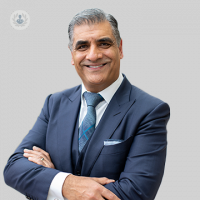Exploring new frontiers in heart surgery: The rise of keyhole bypass procedures
Written by:Coronary Artery Bypass Grafting (CABG) has long been hailed as a life-saving procedure for those suffering from coronary artery disease (CAD). Traditionally, this surgery involved a significant incision through the chest, but recent advancements in medical technology have paved the way for minimally invasive approaches, such as keyhole heart surgery. Understanding these options and when keyhole surgery is the preferred alternative is crucial for patients and healthcare professionals alike. In his latest online article, Mr Inderpaul Birdi gives us his insights.

Understanding CABG:
CABG, often known as bypass surgery, addresses CAD, a condition marked by the narrowing or blockage of coronary arteries due to plaque buildup. This constriction can lead to chest pain or heart attacks. The main objective of coronary artery bypass grafting (CABG) is to reestablish normal blood circulation to the heart by circumventing obstructed or narrowed arteries. This involves attaching a healthy blood vessel, usually taken from the patient's forearm, leg, or chest, to establish a new route for blood to flow.
Traditional CABG surgery:
Traditional CABG, also termed open-heart surgery, involves a lengthy incision in the chest and dividing the breastbone. During this procedure, the patient is often placed on a heart-lung machine to temporarily assist heart and lung function. While effective, traditional CABG comes with drawbacks including increased post-operative pain, longer recovery times, and a higher risk of serious infections, particularly related to the incision site.
Minimally Invasive CABG (Keyhole Surgery):
Minimally invasive CABG, or keyhole surgery, presents a compelling alternative to traditional methods. This approach involves smaller incisions, typically made between the ribs, to access the heart. Key advantages of this technique include reduced scarring, shorter hospital stays (typically 2-3 days), faster recovery times, and a decreased risk of serious infections. Moreover, keyhole surgery often results in less blood loss during the procedure.
Is keyhole surgery the best option for everyone?
While keyhole surgery offers numerous benefits, it's not universally suitable. Factors such as overall patient health, the complexity of CAD, and the surgeon's expertise play crucial roles in determining the most appropriate approach. Keyhole coronary bypass surgery is particularly well-suited for patients with a low body fat index and who are otherwise healthy. Notably, advanced procedures like Total Coronary Revascularisation by Anterior Thoracotomy (TCRAT), performed by highly skilled surgeons, can graft multiple arteries, further expanding the potential benefits of keyhole surgery.
Advancements in medical technology have revolutionised heart surgery, offering patients safer, less invasive options for coronary artery bypass grafting. While traditional CABG remains a reliable choice, keyhole surgery presents a compelling alternative, providing faster recovery times, reduced scarring, and lower risks of complications. Understanding these options empowers patients and healthcare providers to make informed decisions tailored to individual needs, ultimately improving outcomes and enhancing quality of life for those undergoing cardiac interventions.
Mr Inderpaul Birdi is an esteemed cardiothoracic surgeon. You can schedule an appointment with Mr Birdi on his Top Doctors profile.


